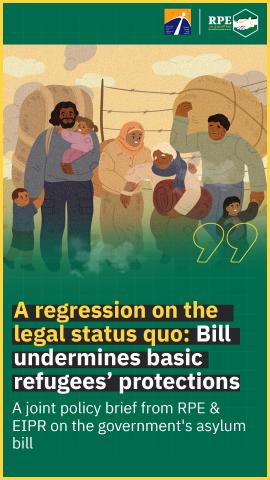The Egyptian Initiative for Personal Rights (EIPR) has filed a complaint with the Supreme Judicial Council against the continued imposition of punitive measures against three of its directors, coinciding with the end of the fourth year of sanc
Programs: Criminal Justice
Refugees in Egypt and the Egyptian Initiative for Personal Rights: The asylum bill inflates security measures and is inconsistent with Egypt’s international obligations
prepared by the Refugees Platform in Egypt (RPE) and the Egyptian Initiative for Personal Rights (EIPR)
Introduction
Yesterday, November 12th, the Supreme State Security Prosecution released defendants on various cases, including EIPR client Abdullah Al-Sayed Ali, who was detained pending Case 2490 of 2024, on charges related to his solidarity with the rights
During the month of September, Egyptian courts issued death sentences to 29 defendants in 20 cases. Among them. Additionally, 9 defendants' papers were referred to the Grand Mufti in 7 other cases.
On Sunday, 10 November, the State Security Prosecution in the Fifth Settlement in Cairo questioned poet and former political prisoner Ahmed Douma for five hours.
The Egyptian Initiative for Personal Rights (EIPR) condemns the blatant violation of the minimum fair trial guarantees to which Ahmed Sabry Nassef has been subjected over the past seven years after the Ministry of Interior failed to implement a
The Egyptian Initiative for Personal Rights (EIPR) holds the State Security Prosecution, the Ministry of Interior – represented by the 10th of Ramadan Prison administration – and the Badr Terrorism Circuits in charge of renewing Sherif El-Rouby
On Thursday, November 7th, poet and former political prisoner Ahmed Douma received an official request to appear before the Supreme State Security Prosecution in the Fifth Settlement on Sunday, November 10th, concerning Case No.
Ihab Masoud Juha, 51 years of age, died two days ago , November 4th 2024, after over five years of unlawful pretrial detention, during which he was subjected to medical negligence that amounts to murder by omission, after the terrorism judicial




